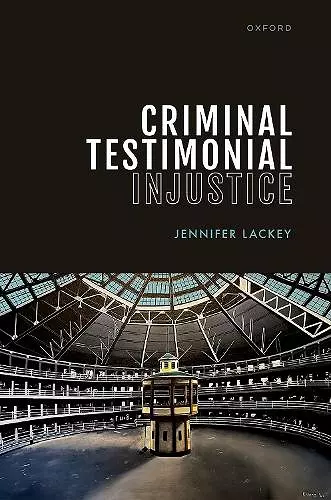Criminal Testimonial Injustice
Format:Hardback
Publisher:Oxford University Press
Published:1st Apr '23
Currently unavailable, and unfortunately no date known when it will be back

Through a detailed analysis that draws on work across philosophy, the law, and social psychology, Criminal Testimonial Injustice shows that, from the very beginning of the American criminal legal process in interrogation rooms to its final stages in front of parole boards, testimony is extracted from individuals through processes that are coercive, manipulative, or deceptive. This testimony is then unreasonably regarded as representing the testifiers' truest or most reliable selves. With chapters ranging from false confessions and eyewitness misidentifications to recantations from victims of sexual violence and expressions of remorse from innocent defendants at sentencing hearings, it is argued that there is a distinctive epistemic wrong being perpetrated against suspects, defendants, witnesses, and victims. This wrong involves brute State power targeting the epistemic agency of its citizens, extracting false testimony that is often life-shattering, and rendering the victims in question complicit in their own undoing. It is concluded that it is only through understanding what it means to respect the epistemic agency of each participant in the criminal legal system that we can truly grasp what justice demands and, in so doing, to reimagine what is possible.
With the combination of incisive analysis, straightforward prose, and fierce passion that has become her trademark, Jennifer Lackey argues that the American criminal justice machine uses coerced speech to systematically undermine the epistemic agency of defendants-and by extension, the pursuit of truth and the very nature of law itself. This is a troubling and deeply important work by one of the most important epistemologists now working. * Michael Patrick Lynch, author of Know-it-All Society and Professor of Philosophy, University of Connecticut *
As someone whose own credibility has been targeted in the American criminal legal system, and who has repeatedly suffered epistemic injustice, I gratefully applaud Professor Lackey's groundbreaking and viscerally moving analysis of the ugliness committed by law enforcement, prosecutors, and some criminal defense lawyers in undermining the supposed search for truth and justice in courtrooms across our nation. * William L. Peeples Jr., Northwestern Prison Education Program Presidential Scholar, Author, and Father *
Jennifer Lackey's Criminal Testimonial Injustice is a systematic indictment of America's criminal legal system. With extraordinary care and rigor, and a background of justified moral outrage, Lackey draws on a detailed knowledge of criminal law and case history to lay out the myriad ways in which our criminal legal system wages epistemic war on those accused of crimes. This work is a framework altering contribution to the analytic tradition in philosophy. * Jason Stanley, author of How Fascism Works and Jacob Urowsky Professor of Philosophy, Yale University *
Jennifer Lackey's Criminal Testimonial Injustice is a revelation, a fresh philosophical take on false confessions and other causes of wrongful convictions. Many false confessors beat themselves up for ceding the truth about their innocence in favor of a pressurized false narrative of guilt constructed by police officers. The indignity of letting someone else narrate your life and then having to watch this false narrative control your life for decades as your case winds itself through the criminal justice system is perhaps the most painful aspect of false confessions. Professor Lackey has given me a new vocabulary to describe it—it's the ultimate denial of a person's 'epistemic agency.' * Steven Drizin, Co-Director, Center on Wrongful Convictions and William M. Trumbull Clinical Professor of Law, Northwestern University *
Lackey identifies a form of epistemic injustice that she reveals as endemic in the US criminal justice system. The resulting critique is as compelling as it is far-reaching. * Miranda Fricker, Professor of Philosophy, New York University *
ISBN: 9780192864109
Dimensions: 240mm x 165mm x 20mm
Weight: 490g
224 pages